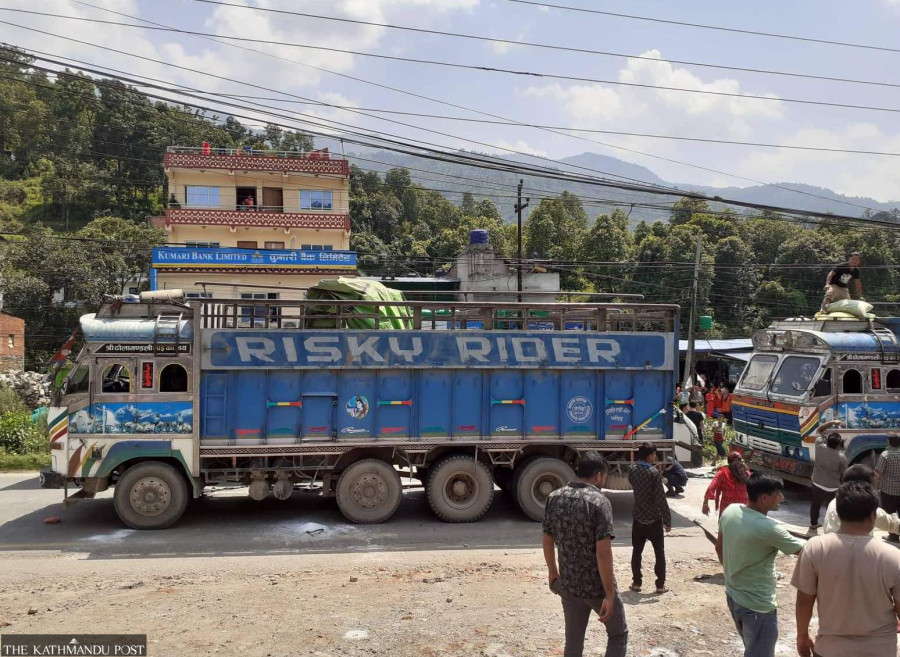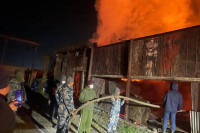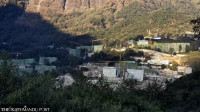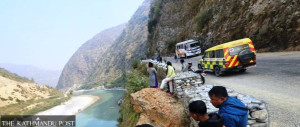Bagmati Province
Desperate farmers seize fertilisers in Dhading
The smuggled farm inputs were being escorted to Kathmandu when people intercepted trucks and ran away with sacks.
Sarita Shrestha
Farmers across the country have been reeling under acute shortages of chemical fertilisers without which they worry their paddy harvest will be badly impacted.
The paddy plantation season has already begun, but despite repeated promises, the government has not been able to ensure the vital farm nutrient.
On Saturday, locals of Dhading got wind of the fact that at least two trucks carrying chemical fertilisers would be heading to Kathmandu.
Acting on a tip-off, the Department of Revenue Investigation had impounded the trucks in the Kurintar area along the Prithvi Highway for carrying chemical fertilisers smuggled from India. Armed Police Force personnel were escorting the trucks.
But suddenly, local farmers of Dharke in Dhunibesi Municipality-6, Dhading, intercepted the two trucks loaded with chemical fertilisers, as they were being escorted to Kathmandu, at around 1:30pm on Saturday.
A pandemonium erupted. Security personnel failed to contain the sudden flow of the crowd. Farmers seized sacks of fertilisers and ran away.
“The farmers, around 400 in numbers, had gathered earlier today on the highway and were waiting for the trucks. They then intercepted the trucks and took away the sacks,” said Krishna Hari Thapa, a farmer from Thakre Rural Municipality-8 in Dhading.
The incident shows how desperate farmers are for the farm inputs.
The traders involved in the smuggling seem to have informed the local farmers that the Department of Revenue Investigation was taking the impounded vehicles to Kathmandu, thinking that they would be able to dodge legal action if farmers take away the chemical fertilisers.
Farmers have accused traders of selling smuggled fertilisers in the local market of Dhading by charging hefty amounts.
Officials said there were around 550 sacks of chemical fertilisers in the two trucks.
As Nepal faces a severe fertiliser crunch, smuggling cases are common in the country, but such incidents are usually reported along the border areas.
The Dhading incident on Saturday may be a one-off incident but it also symbolises how citizens often tend to react when the state fails in its fundamental responsibility of ensuring a basic amenity like fertilisers.
“We were informed that the trucks ferrying the smuggled fertilisers were seized by the Department of Revenue Investigation. The farmers took the trucks under control and ran away with the fertilisers while the vehicles were being taken to Kathmandu,” said Deputy Superintendent Jageshwar Bhandari.
Dhurba Prasad Koirala, assistant chief district officer of Dhading, said investigation is underway after taking the trucks and drivers under control.
“We are yet to know where the fertilisers were being transported from or who were involved in the smuggling,” said Koirala.
According to the Agriculture Ministry, Nepal's annual requirement of chemical fertiliser is 600,000 tonnes. One-third of this, or 210,000 tonnes, is used during the paddy planting season, and farmers must have at least 150,000–170,000 tonnes to avoid a disaster.
The paddy transplantation season runs from early June to August. If the monsoon is delayed, the transplantation period extends to September.
The DAP requirement for the paddy season is 60,000 tonnes. The Ministry of Agriculture says there is no shortage of DAP this season. But urea stocks have almost run out.
Paddy is a major contributor to the economy, accounting for 7 percent of the country’s gross domestic product.
Nepal’s bid to procure fertilisers from India under a government-to-government agreement has yet to yield results. Earlier this month, Agriculture Minister Mahendra Rai Yadav was in New Delhi to follow up on fertiliser procurement from India.
India itself is one of the worst affected by the worldwide fertiliser crisis. India imports up to a third of its fertilisers and is the world’s biggest buyer of urea and di-ammonium phosphate.
To fast-track the supply, Nepal also cleared legal hurdles. But farmers are still waiting to get the farm nutrients.
Last week, the Parliament told the government to ensure chemical fertilisers by any means necessary even as countries around the globe are scrambling to avert a seemingly inevitable drop in crop yields due to a worldwide shortage of nutrients.
The government had allocated Rs15 billion to import fertiliser for this fiscal year. Initially, it was estimated that the amount would be enough to buy at least 500,000 tonnes. But due to the rise in prices, officials say, it might be difficult to buy even 200,000 tonnes with the money.
According to the Department of Customs, Nepal had imported 172,000 tonnes of chemical fertilisers in the first 10 months of the current fiscal year ending mid-July.
Over the coming months, a major challenge will be in accessing fertilisers, which may impact food production across many crops in different regions, according to the World Bank’s May report on food security.
Agro experts say urea needs to be applied during the transplantation and then first top dressing—two to three weeks after transplantation.
On Saturday, security personnel even resorted to using force to stop the crowds from taking away the fertilisers.
Locals said the farmers were happy to get hold of some sacks of fertilisers, as for them, something is better than nothing.
“We face shortages of fertilisers when we need them the most. The local traders charge Rs2,200 per sack though it generally costs Rs900,” said Thapa, the farmer from Dhading. “The farmers cannot have a good harvest of paddy, maize and other crops without chemical fertilisers.”




 15.12°C Kathmandu
15.12°C Kathmandu













